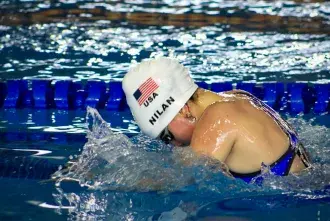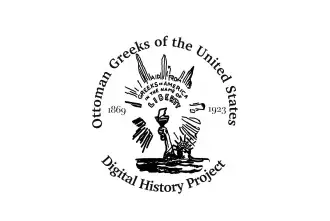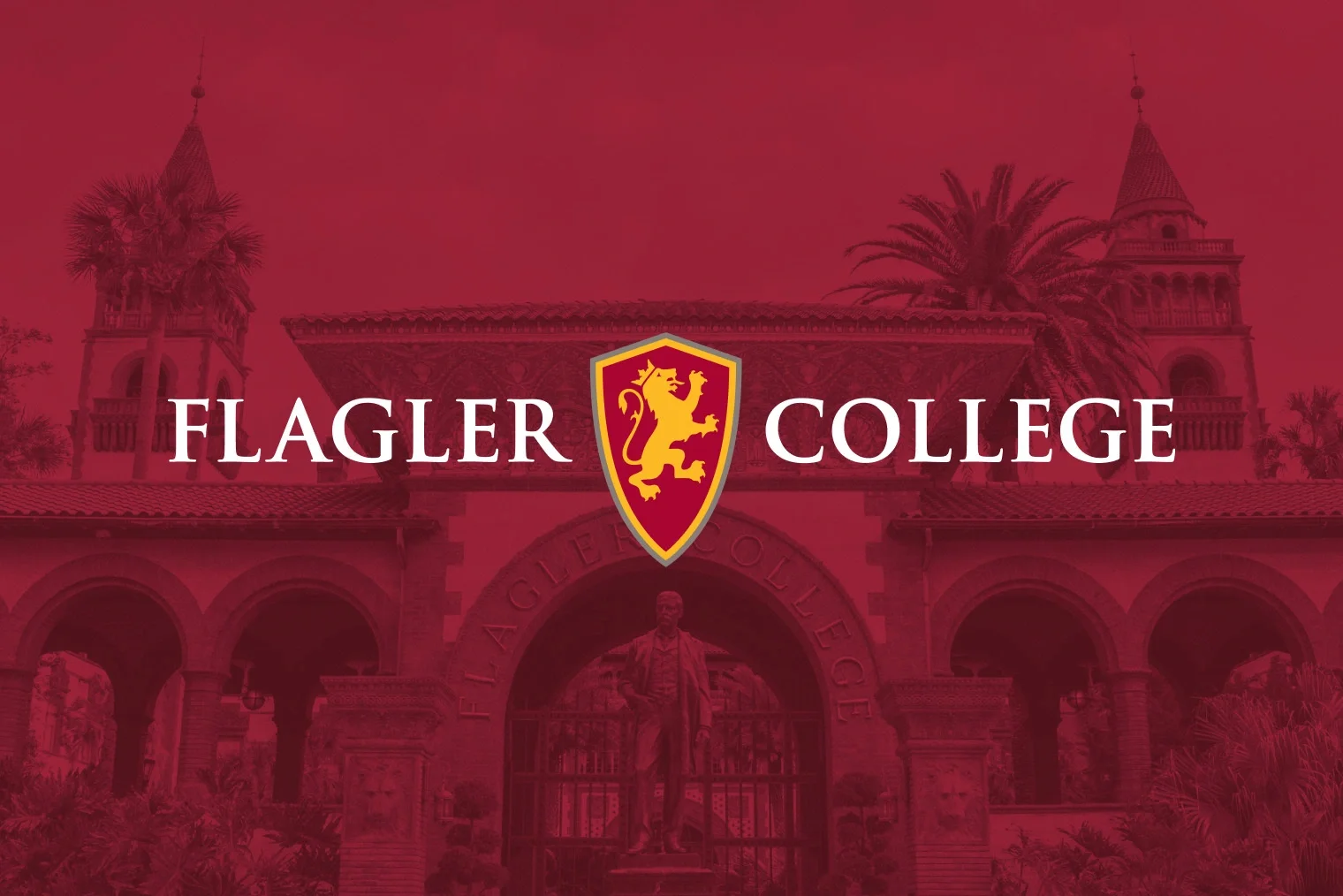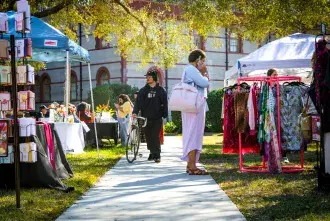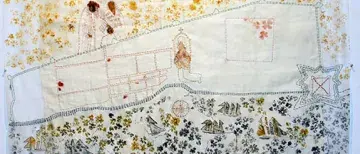
On Saturday, March 5 at 6pm Hampton will join her esteemed colleagues Dr. Kathleen Deagan, and Dr. Jane Landers in a panel discussion to contextualize where the Clarke-Garvin family fit into the histories of Spanish Florida and United States. This panel discussion will take place in the Flagler Room at Flagler College and will also be livestreamed. These events are free and open to the public, and masks are required. The Origins exhibition will continue through Saturday, April 23.
Through extensive genealogical research Karen Hampton has traced her family to descendants in St. Augustine, Florida that includes the British-born George J.F. Clarke (1774-1836), who served as the Surveyor General and Lieutenant Governor during the Second Spanish Period, and his unmarried wife Flora Leslie (1771-1832), a formerly enslaved woman whom he manumitted. The fascinating story of their large, multiracial, land-owning family in the late 18th to mid-19th centuries has been the catalyst for an ongoing body of work since her first visit to St. Augustine in 2006.
Hampton’s work utilizes hand-woven textiles, digital prints and embroidery on cloth, and hand dyed fabrics to consider her own lineage, and how these individuals are connected to Black American history within Spanish Florida, the United States, and the African Diaspora. Often merging ancestral methods of textile production with more experimental contemporary processes, the work represents a window into the world her ancestors had to traverse, from the late 1700s to the Civil War, and the return to their homeland in Florida.
A site visit in June 2021 served as further inspiration for new works Hampton has created for this exhibition. In the installation America, Now and Then, narrowly woven indigo and bast fibers unfurl and curl around vintage spools from weaving mills in Lowell, Massachusetts where the artist lives and works. Running close to twenty yards long, the work suggests an aerial view of the landscape or a map. As Hampton has explained, this piece represents the distance along the coast from Fernandina to St. Augustine as well as considers the means of production of the transatlantic slave trade and speaks to the role of northern financiers who enabled the system. Fort Mose and the Oysters is derived from a photograph the artist took of the grove of trees that stand where Fort Mose, the first legally sanctioned free African settlement, once stood. Fort Mose Historic State Park extends into a tidal creek where plentiful oyster beds are exposed at low tide. This material is abundant along the waterways of Northeast Florida, where her ancestors once traveled, and has been used more broadly as the building blocks of society in Florida. The landscape of Northeast Florida has become a poetical point of departure for Hampton to consider connections between the past and present, and through a combination of stories and historical documentation from the lives of George J.F. Clarke, Flora Leslie, and their descendants, the artist has crafted a generational story of love, dedication, and survival.
Karen Hampton has held recent solo exhibitions at venues such as Michigan State University Union Art Gallery (2018), Jack Bell Gallery, London (2017), Honolulu Museum of Art (2016-17), and Ruth and Elmer Wellin Museum of Art (2015). Her work has also been included in several group exhibitions including gallery FRITZ, Santa Fe (2018), Roberts Project, Culver City, CA (2018) Pomona College (2015), Muskegon Museum of Art (2012-15), GATEWAY Art Center (2011), and Washington, D.C. (2008-11). Hampton is an Assistant Professor of Fine Art at Massachusetts College of Art and Design in Boston.
Dr. Kathleen Deagan is Distinguished Research Curator of Archaeology Emerita and the Emerita Lockwood Professor of Florida and Caribbean Archaeology at the University of Florida.
Her research has focused on the archaeology of the Spanish colonial period in Florida and the Caribbean. She has conducted excavations in St. Augustine, Florida, since 1972, including the identification and excavations of Ft. Mose, America’s first free black community, and Florida’s first Spanish settlement (1565-66). Since 1980, she has directed excavation programs in the Caribbean, including La Isabela, Christopher Colombus’s first town in America in collaboration with José M. Cruxent. She has also directed archaeological programs at Concepción de la Vega (1496-1562) in the Dominican Republic, Puerto Real, Haiti (1502-1578), and the En Bas Saline site in Haiti -- a large Taíno town thought to be the site of La Navidad, Columbus’s first fort, in 1492. She has been a consultant on historic preservation and archaeology in Spain, Venezuela, Panama, Peru, Jamaica, and Honduras.
Deagan is the author of eight books and more than 70 scientific papers. She was named an Alumna of Outstanding Distinction by the University of Florida in 1998, and is a recipient of the Society for Historical Archaeology’s J.C. Harrington Award for Lifetime Distinction. In 2016 she was elected to the American Academy of Arts and Sciences, and in 2018 was elected to the Academia de História de la República Dominica. She has been awarded the “Order of La Florida” by the City of St. Augustine in 2007 for distinguished service to the city.
Dr. Jane Landers is the Gertrude Conaway Vanderbilt Professor of History at Vanderbilt University. She is Director of the Slave Societies Digital Archive and since 2015 has served as the U.S. member on UNESCO’s International Scientific Committee for the Slave Route Project. Landers’ award-winning monographs include Black Society in Spanish Florida and Atlantic Creoles in the Age of Revolutions and she is the co-author or editor of five other books dealing with the history of African and Indigenous resistance in Florida and the Atlantic World. Her research has been supported by the John Simon Guggenheim Foundation, the National Endowment for the Humanities, the American Council of Learned Societies, the Andrew W. Mellon Foundation, and the British Library Endangered Archives Programme, among others. She has served as President of the Conference on Latin American History and Founding Chair of its Atlantic World Section, the Forum on Early-Modern Empires and Global Interactions, and the Latin American and Caribbean Section of the Southern Historical Association, and currently serves as Chair of the Committee on International Historical Activities of the American Historical Association.
This program is supported by a grant from the Dr. JoAnn Crisp-Ellert Fund at The Community Foundation for Northeast Florida.
For more information about our programming and upcoming events, please visit the website at www.flagler.edu/ceam, follow us on Instagram (@crispellertart) or Facebook (Crisp-Ellert Art Museum), or contact Julie Dickover at 904-826-8530 or crispellert@flagler.edu.
